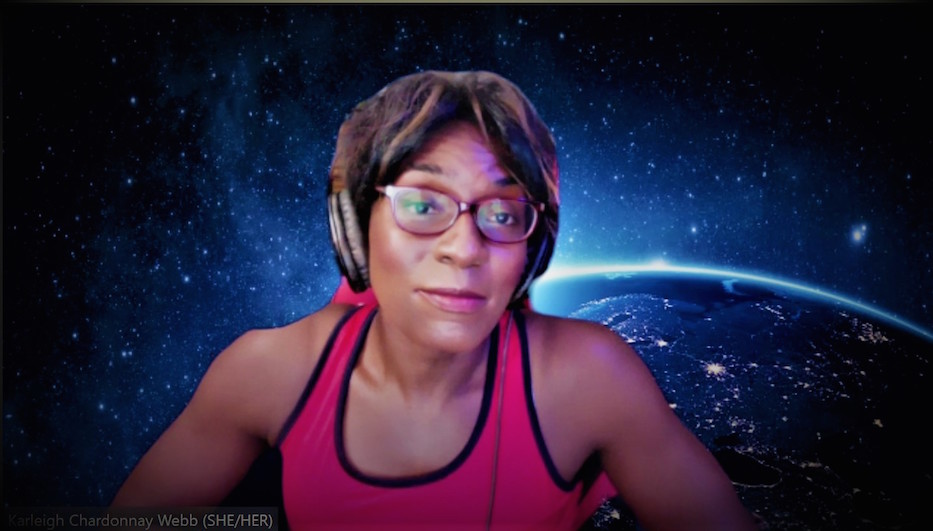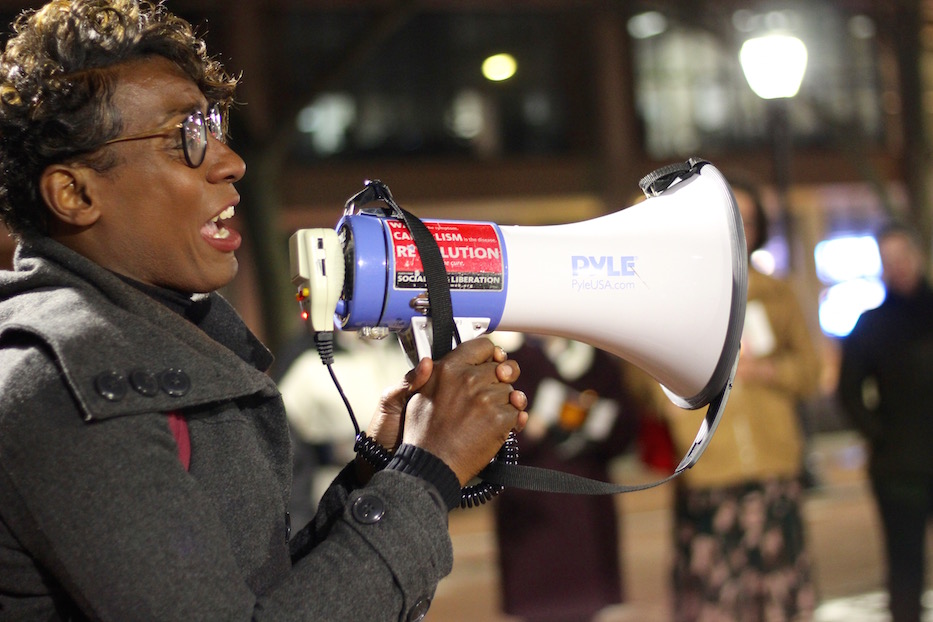
LGBTQ | Arts & Culture | New Haven Pride Center | COVID-19

| Screenshot from Zoom. |
Before the virtual seminar started, Karleigh Chardonnay Webb instructed participants to grab something to write on.
“This is not going to be me sitting around doing a lot of lecturing,” she said. “Know this—I will tell you right now—this will be a very interactive writing workshop.”
Sunday afternoon, Webb lead Workshop: Writing Your Truth through the New Haven Pride Center. The workshop was the center’s second installment in its #ArtAgainstViolence campaign, a four-part series that combats violence against the LGBTQIA+ community through artistic expression. The series will culminate in an exhibition that open at the center, with viewing options online, later this month.
As of this month, The Human Rights Campaign has identified over 26 homicides against transgender and gender non-conforming people. It notes that many more deaths go unreported. In such turbulent times, Webb focused her seminar on healing.
Webb, who grew up in Omaha, Neb., is a prominent transgender activist who has spoken at the New Haven 2019 PRIDE March, the city’s annual Transgender Day of Remembrance (TDOR), and "Trans and Talented” open mic nights. Last year she performed in the Ely Center of Contemporary Art’s Trans Body II. She saves the lives of trans youth through her work at Trans Lifeline, pulling them through crises over the phone. She’s an Outsports writer and a journalist with over 26 years of experience in the field.
And above all, Webb said she recognizes writing’s curative power.
“How do we use writing to tell our stories?” she asked Sunday. Her eyes searched attendees’ faces as the seminar began. “How do we use words and the pictures we create with words to tell our stories, tell our joys, and talk about the pitfalls? How do we cut the trauma that we deal with as a community down into something manageable? How do we use writing to heal?”

| Webb in 2019, at a remembrance ceremony for the Transgender Day of Remembrance. Lucy Gellman File Photo. |
Webb promptly instructed participants to write—each had four minutes to form an introduction and read it aloud for the group. She watched some pens flow across pages, giving birth to paragraphs. She watched others scratch out choppy sentences. What participants didn’t know was that Webb wasn’t looking for perfection in style, syntax, or structure: she wanted to hear a voice, to see the “symphonies written in their heads” on paper.
As Webb put it: “Finding your own voice has the power to move people.”
Webb was frightened to let that voice out when she was young. Nearing college, she felt hopeless: she was an athlete but described herself as not good enough to gain an athletic scholarship. In that depression, writing found her. She joined the school newspaper and became enthralled with ink and newsprint. Still, mounting insecurity soon overshadowed any excitement—Did she even have something to say? What if she sounded stupid? What if people thought her ideas were unimportant?
Webb expected all those fears in participants as she called for the next assignment.
“You have six minutes,” she declared. “In those six minutes, I want you to write down three things that you believe in strongly—three hills which you are willing to die on.”
This was another hidden key to powerful writing. Most participants scrambled to finish their first thought at the end of time. As the small group shared, it was evident that people were passionate about their ideas, punctuating points verbosely. Webb laughed—the key to this exercise was short, declarative sentences.
She’d learned the same lesson starting in the journalism industry. When she first got to ESPN, Webb would write features. When the staff saw her work, they tore it apart. Webb’s writing was “too flowery” and sounded like she was “trying too hard.” Determined to improve, Webb sought out a writing coach. After reviewing her work, he immediately sent Webb off to read Ernest Hemingway’s The Old Man and the Sea. Confused and annoyed, Webb begrudgingly took up the task. Now, she owns almost all of Hemingway’s novels.
“When I was first reading it, it read like Fun with Dick and Jane, because the prose was so simple,” Webb remarked. “I soon realized he could take a string of four-word sentences and bridge them to the next, and the next. He gives you a number of complete thoughts—it was full, simple, declarative, beautiful, and powerful. When there was a word that needed impact, it had impact.”
“In our community, we want to express who we are, but it just explodes out because we've been under so much,” she added. “It’s like when you have a can of soda—you shake it up, put it under so much pressure, and it sprays out. That's what short, powerful, declarative writing does—it comes out and grabs people.”
Webb’s final challenge called for tact in emotional release—participants had eight minutes to write a letter to the past—who they were the day they “came out.” Those eight minutes were a warm silence. Pens danced across pages. Some grasped their sticks tight. Others squinted through hazy memory. All had a story to tell. Finally, after eight minutes and thirty seconds, the silent symphony ceased.
After an emotional session, Webb shared what she’d written during the exercise:
Okay, me, I know you're a little young to understand all this, but I know about what happened today. I know about your friend. I know about the cheer skirt. I know you really want to be an anime princess in combat armor driving a mecha. I know about it because I was there.
Listen, I know right now you want to hide. We hate being bullied, and people try to bully you— at 12 when you were being bullied, and at 16, when you were being made fun of, and in college, when you were being doubted. I'm here to tell you something—do not quit. Do not back down and know that we will make it through.
Webb left viewers with a message as the workshop came to a close.
“The biggest thing about writing, especially among our folx, no matter where in the spectrum you are, is that sometimes, what we put down on a page can not only help us, it can help another person," she said. "It can be powerful, and they can be. Through writing, I've come to terms with a lot of my own vulnerabilities. I’ve come to terms with a lot of my own dysphoria. Writing heals—through writing, we claim our power and give that power to each other. By naming that anger and that resentment, all those things that block healing, we push through them, and we help each other push through.”
The New Haven Pride Center’s exhibition on #ArtAgainstViolence opens Aug 24. Find out more at the organization’s website.

